UNESCO 4th World Congress of Biosphere Reserves (4WCBR) held at Lima- Peru, March 14-17, 2016 ECO Science Foundation also Participated
Go Back

The 4th World Congress of Biosphere Reserves (4WCBR) with the theme; "A New Vision for the Decade 2016-2025" was held at Lima- Peru from 14-17 March, 2016. UNESCO Biosphere Reserves, National Committees of UNESCO’s Man and the Biosphere (MAB) Programme as well as experts involved in the practical implementation of biosphere reserves; including representatives of governments, biosphere reserves, local communities, UN agencies, NGOs, academic institutions and organizations working with the MAB Programme from all over the world participated in the congress.
The Congress focused on three main objectives:
- review of the implementation of the Madrid Action Plan for Biosphere Reserves 2008-2013 and the Seville Strategy and the Statutory Framework of 1995;
- assess the lessons learned and the new challenges to be faced by the World Network of Biosphere Reserves (WNBR), and
- develop and launch an Action Plan for Biosphere Reserves for 2016-2025.
The Congress addressed issues related to Biosphere Reserves; the economic viability of nature conservation systems, biodiversity & ecosystem services and the protection and sustainable use of natural resources linking with UN Sustainable Development Goals (SDGs) and how to achieve some SDGs through Biosphere Reserves (BRs) Networks. During the Congress, experts discussed progress of and obstacles to BRs and work to develop a new vision for next decade 2016-2025. It was opened by the Minister of Environment of Peru, the Assistant Director General (Natural Sciences) of UNESCO Ms. Flavia Schlegel and the President of International Coordination Committee (ICC) of the BR Program Mr. Sergio Guevara. For more details:
http://www.unesco.org/new/en/natural-sciences/environment/ecological-sciences/4th-world-congress/
In all, over 1000 experts, officials and policy makers from around the world participated in the congress. President ECO Science Foundation Dr. Manzoor Hussain Soomro also participated in the congress. He was an invited speaker and a Panellist in a side workshop; “The Silk Road Initiative: Connecting Biosphere Reserves for Sustainable Development” in 4WCBR and also presented the outcome of workshop in the subsequent Plenary session. Speakers of the Closing Plenary at the Lima Convention Centre included; the ADG for Natural Sciences of UNESCO Ms. Flavia Schlegel, Secretary MAB Dr. Qunli Han, President of UNESCO Executive Board and the Minister for Environment of Peru.
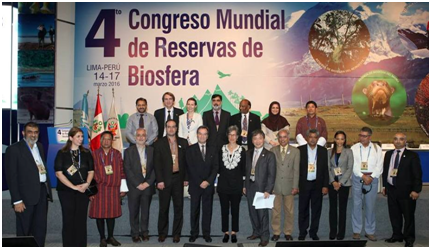 Others who participated in the congress from ECO countries include Dr. A.M. Fazel, President of ECO Institute of Environmental Science and Technology (IEST)- Iran, Ms. Mehrasa Mehrdadi (Iran), Dr. Roman Jashenko VP MAB ICC from Kazakhstan and a delegation from Pakistan. Pakistan's delegation was led by Secretary Ministry of Climate Change (MoCC)- Mr. M. Akif, Secretary National MAB Committee- Dr. M. Rafique from PMNH-PSF, Secretary Wild Life from AJ&K and the Manager of Lal Suhanra Biosphere Reserve Bahawalpur. ECOSF collaborators EvK2CNR were also represented in the Congress by Mr. Ashiq Ahmad Khan in the 4WCBR. During the 4WCBR, a meeting of the South and Central Asia MAB (SACAM) Network was also held on the sidelines of the congress.
Others who participated in the congress from ECO countries include Dr. A.M. Fazel, President of ECO Institute of Environmental Science and Technology (IEST)- Iran, Ms. Mehrasa Mehrdadi (Iran), Dr. Roman Jashenko VP MAB ICC from Kazakhstan and a delegation from Pakistan. Pakistan's delegation was led by Secretary Ministry of Climate Change (MoCC)- Mr. M. Akif, Secretary National MAB Committee- Dr. M. Rafique from PMNH-PSF, Secretary Wild Life from AJ&K and the Manager of Lal Suhanra Biosphere Reserve Bahawalpur. ECOSF collaborators EvK2CNR were also represented in the Congress by Mr. Ashiq Ahmad Khan in the 4WCBR. During the 4WCBR, a meeting of the South and Central Asia MAB (SACAM) Network was also held on the sidelines of the congress.
After the first day of Plenary Sessions, numerous side events and workshops were organized by some MAB Networks and Organizations/NGOs on various regional aspects of MAB Programs linking it with SDGs. On the final and fourth day (17th March) , all groups converged and presented the outcomes of the side events and reports for shaping the MAB Program for next decade (2016-2015)
The Silk Road Initiative: Connecting Biosphere Reserves for Sustainable Development Side Workshop during the 4WCBR- March 16, 2016
A side workshop during the 4WCBR was organized by the UNESCO Regional Science Bureau for Asia and the pacific Jakarta on, "Silk Road Initiative: Connecting Biosphere Reserves for Sustainable Development" on March 16, 2016. Prof. Dr. Shahbaz Khan, the Director UNESCO Jakarta was the initiator and moderator of the workshop. The Secretary MAB UNESCO- Dr. Qunli Han also shared his wisdom in the workshop. Since the trade on the Silk Road was a significant factor in the development of the civilizations of China, the Indian subcontinent, Persia, Europe, the Horn of Africa and Arabia, opening long distance, cultural, political and economic relations between the civilizations. The UNESCO Man and the Biosphere (MAB) programme and its World Network of Biosphere Reserves (WNBR), through the Silk Initiative offer a connectivity tool to achieve sustainable development across Asia, Africa and Europe.
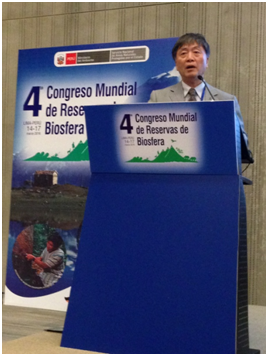
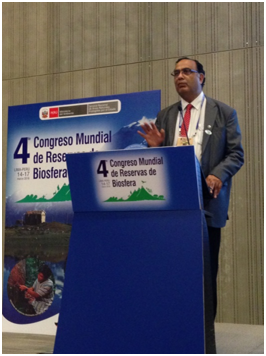
Main Objectives of the Silk Road Initiative included; building a transcontinental network of BRs; promotion of Sustainable Development of local communities across different continents; showcase opportunities BRs could offer and best practices of sustainable development and facilitate international connectivity and cooperation towards the delivery of the Agenda 2030.
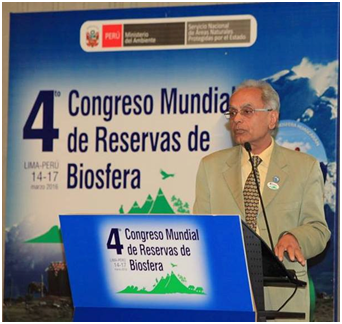 Dr. Manzoor Hussain Soomro President ECOSF delivered a talk entitled; “Silk Road – Connecting People for Peace and Sustainable Development in ECO Region through the Power of Biosphere Reserves and IBSE”. In his talk Dr. Soomro focused on the significance of Silk Road with reference to ECO member states. He elaborated that almost all the 10 Member States in ECO Region are situated along Silk Road. Two International Economic Co-operation Corridors of the Belt and Road Initiative proposed by China will be built in the ECO Region including China-Central, Asia-West Asia and China-Pakistan Economic Corridor (CPEC). Dr. Soomro said that Silk Routes have traditionally connected geographical areas and people in Asia, Africa and Europe since ancient times and can be followed for connecting people again. He emphasized that the communities and regions along the Silk Routes are vulnerable to climate change and are also under pressure from population growth, resource depletion, and poverty. Thus, promotion of Biosphere Reserves concept can lessen pressure on resources, improve management of environmental risks & increase the welfare of the poorest, as well as advance the Sustainable Development along the Silk Road. He further mentioned that ECOSF being an Inter-Governmental Organization in the region is aimed to promote and fund collaborative scientific research and Inquiry Based Science Education (IBSE) at grass root level and promote gender balance- thereby promoting UN Agenda 2030. He proposed that ECO being Stakeholder of IPBES in the Region has a great potential and could play an active role and would welcome to join hands with MAB- UNESCO Programme for pursuing Agenda-2030 through educating and engaging school children & teachers, college and university students and youth in general on SDGs and conservation of Natural Resources for Sustainable Development along the Silk Road in ECO Region in particular.
Dr. Manzoor Hussain Soomro President ECOSF delivered a talk entitled; “Silk Road – Connecting People for Peace and Sustainable Development in ECO Region through the Power of Biosphere Reserves and IBSE”. In his talk Dr. Soomro focused on the significance of Silk Road with reference to ECO member states. He elaborated that almost all the 10 Member States in ECO Region are situated along Silk Road. Two International Economic Co-operation Corridors of the Belt and Road Initiative proposed by China will be built in the ECO Region including China-Central, Asia-West Asia and China-Pakistan Economic Corridor (CPEC). Dr. Soomro said that Silk Routes have traditionally connected geographical areas and people in Asia, Africa and Europe since ancient times and can be followed for connecting people again. He emphasized that the communities and regions along the Silk Routes are vulnerable to climate change and are also under pressure from population growth, resource depletion, and poverty. Thus, promotion of Biosphere Reserves concept can lessen pressure on resources, improve management of environmental risks & increase the welfare of the poorest, as well as advance the Sustainable Development along the Silk Road. He further mentioned that ECOSF being an Inter-Governmental Organization in the region is aimed to promote and fund collaborative scientific research and Inquiry Based Science Education (IBSE) at grass root level and promote gender balance- thereby promoting UN Agenda 2030. He proposed that ECO being Stakeholder of IPBES in the Region has a great potential and could play an active role and would welcome to join hands with MAB- UNESCO Programme for pursuing Agenda-2030 through educating and engaging school children & teachers, college and university students and youth in general on SDGs and conservation of Natural Resources for Sustainable Development along the Silk Road in ECO Region in particular.
He also informed the audience that ECO Science Foundation, CAST China, ISTIC Malaysia and IAP SEP have already planned an IBSE workshop in July 2016 at Karamey in Xinjiang, West China linked with “One Belt- One Road”.
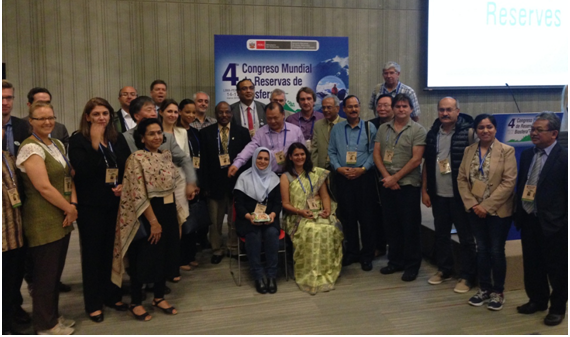
The key messages from the workshop were as follows:
- There is a need for the MAB Programme to take a multi sectoral approach along the multiple Silk routes, building on ecological, socio-cultural, education and cooperation aspects.
- Combine Science, Technology and Innovation and green development concepts for the longer term sustainability of the Silk Road BR network.
- Include Silk Road branding, such as Silk Road Products from the BRs.
- Build on existing knowledge institutes and networks (such as UNESCO Category 2 Centers and Chairs) as well as use existing economic cooperation frameworks (such as ASEAN, ECO, etc).
- Social and economic capital can build on Silk Road common understanding and values.
An UNESCO MAB Silk Road BR network meeting will be planned as a follow up of this initiative.